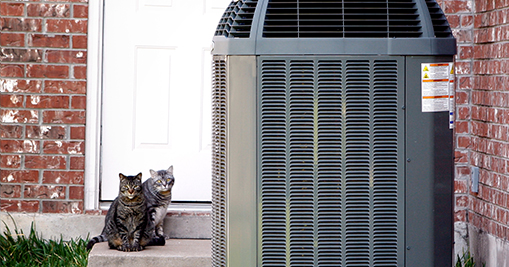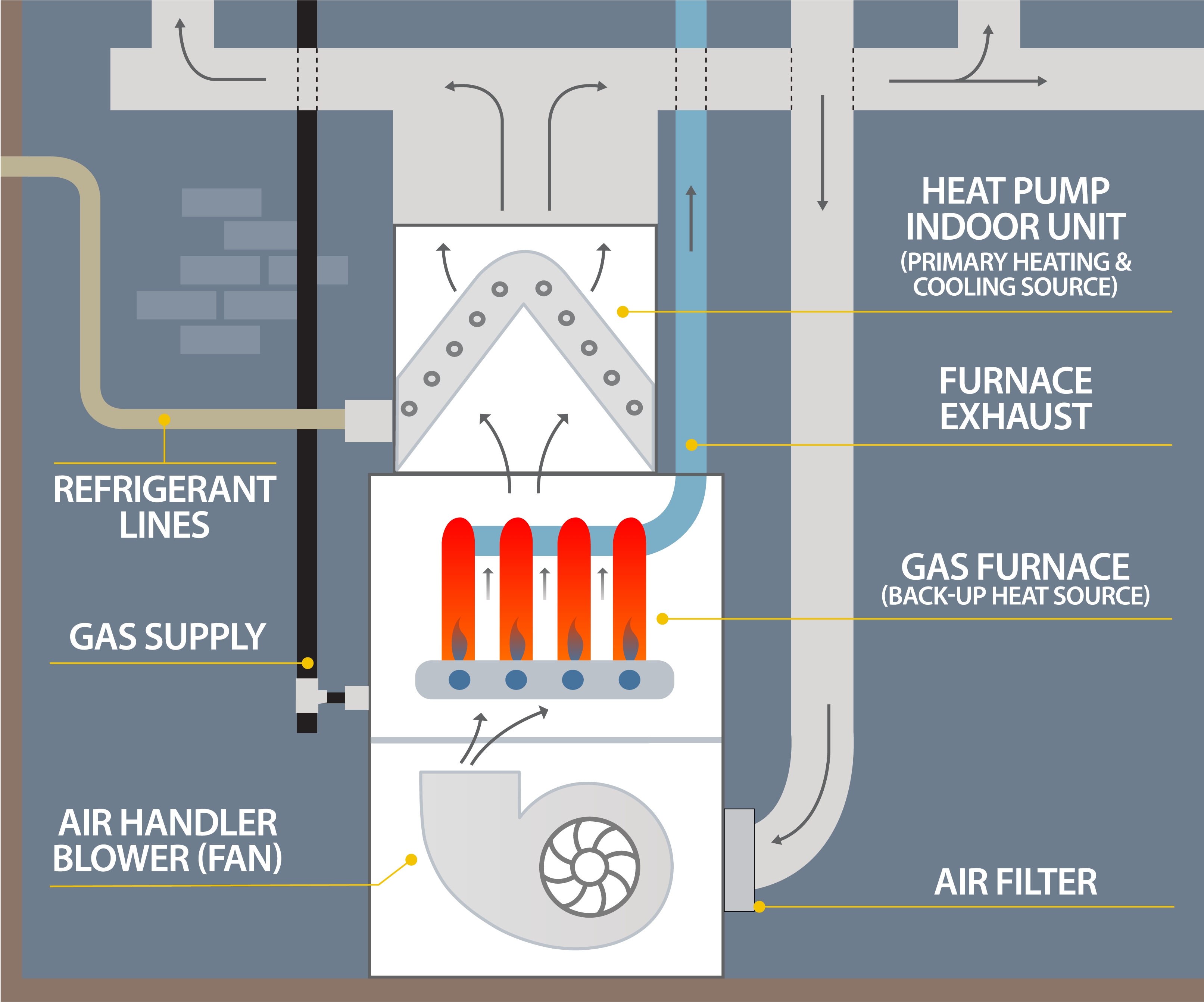
Dual fuel heat pumps: advancing beneficial electrification
Residential homes count for 20% of carbon emissions in the U.S., and most of that comes from heating and cooling. One key strategy to meet our decarbonization goals is electrification of space heating with heat pumps. However, as it stands today, only 5% of homes in the Northeast and Midwest use heat pumps for space heating.
Our goal is to decarbonize across every sector. If that’s the case, then residential settings might be the last emissions we can allow. As one piece of the electrification puzzle, dual fuel heat pumps—sometimes known as "hybrid fuel" or "hybrid heat pumps"—can advance electrification in the short term and ease the market into a more fully electrified future.
Dual fuel heat pumps can initiate electrification
In a 2020 dual fuel heat pump pilot for MECA, we discovered on average homes offset over half their propane usage and saved $300-$1,000 annually compared to a propane furnace and central AC, amounting to an average payback period of four years.
A Note on Heat Pump Systems
Within the category of dual fuel heat pumps, it's important to acknowledge the general differences between two types of compressors:
- Single-stage: lower equipment cost; sizing limitations; average operating cost
- Variable-capacity: higher equipment cost; required for standalone performance in cold climates; lower operating cost
In the pilot mentioned above, two of the heat pumps had only one-stage compressors and performed comparable to the variable-capacity heat pumps in terms of efficiency, cost savings, and homeowner satisfaction. The incremental cost of these simple heat pumps over an air conditioner is much lower than the incremental cost of most variable-capacity heat pumps.
Any heat pump is better than no heat pump.
While the heat pump market may evolve to a point where single-stage compressor systems are obsolete, today they represent a vital option for residents on a tighter budget and should be included as the base option in any "good-better-best" contractor offer to replace an AC—whether the existing furnace is propane, fuel oil, or natural gas.
The risks of rushing electrification
Electrification is too important to risk consumer rejection of heat pumps in the next few years. Public opinion could turn against heat pumps if we don't anticipate—and accommodate for—the potential drawbacks.
Cold Weather Costs
Air source heat pumps work less efficiently at colder temperatures and sometimes need supplemental heat during extremely cold winter days. Under current rate structures, utility bills could be too high when that supplemental heat comes from electric resistance heating. Under current rates, dual fuel is a more affordable way to deliver supplemental heat when it is most needed.
All-electric heating also presents an issue to the current grid capacity. Just as air conditioning test the grid's capacity on the hottest summer days, heat pumps could stress the grid during winter peaks since they work less efficiently in colder temperatures and often need to rely on electric resistance backup during periods of extreme cold. When there is a high penetration of all-winter heat pumps, cold snaps could result in market price spikes, and in a worst case scenario, power outages.
Heat Pump Hesitancy
When ASHPs hit the mainstream market, some homeowners simply won't want to install a heat pump. Others might balk at minor issues, such as how the delivered air temperature is lower than they might be used to with a furnace.
We need to account for these customers and emphasize how comfort improves with properly selected and designed heat pumps and set the right expectations for how heat pumps most efficiently and effectively deliver comfort.
Dual fuel heat pumps can replace gas furnaces in a way that isn’t too jarring to most customers.
In our market surveys, many HVAC contractors have pointed out that natural gas makes up most of the heating market, particularly in the Midwest and northeastern U.S. For many contractors, it wouldn't make sense to change the fundamentals of their business model to incorporate air source heat pumps until there's a solution that can serve that majority customer base.
Inequitable Rollouts
We must consider the people least able to afford to heat their home with a heat pump. Aren't they being left behind if we rapidly roll out electric heat pumps without careful attention to residents at the lower end of the income distribution?
Fixed charges make up a significant source of revenue for a gas utility to maintain the infrastructure and service and if there are fewer customers with a gas meter, those fixed charges are spread over fewer residents—meaning higher bills.
Heat pumps shouldn't be a luxury item—they're a necessity to reduce carbon in our homes and ensure a clean energy future. Any decarbonization plan must include a reasonable path to comfortable heating and cooling for everyone. Incentives such as equipment discounts, fair financing, and special electric heat rates can help.
In all these scenarios, dual fuel heat pumps can replace gas furnaces in a way that isn't too jarring to most customers.

The benefits of dual fuel heat pumps
Any heat pump is better than no heat pump. It's safe to say that a dual fuel heat pump would be an instant upgrade for any home with a furnace–especially one with an existing central air conditioner. Still, there are several reasons why dual fuel makes sense in the short term for both customers and utilities.
Flexibility for Customers and Utilities
Dual fuel heat pumps allow customers to adapt to changing temperatures and fuel prices, since they can easily alternate power or fuel sources. Plus, like other advanced electric technologies, many dual fuel heat pumps can be programmed to optimize economic or environmental impacts according to utility goals.
An Opportunity for Electrification
As we've identified, cost remains the biggest barrier to widespread electrification. Even in the coldest states, dual fuel can often cost-effectively meet the space conditioning needs of a home for a significant number of hours each year.
Since a dual fuel heat pump relies on a backup furnace, it can be sized smaller and doesn't need to have the same cold temperature heating capacity retention needed if it was shouldering the entire heating demand.
Most Cost-Effective When Replacing Air Conditioning
A dual fuel heat pump is most cost-effective when including the cost of a cooling system in the baseline. The cost effectiveness is less clear if a customer adopts the heat pump for heating only—but given an estimated equipment life of 15 years, payback is certainly plausible.
Carbon Emissions (Before Renewables)
In terms of carbon emissions, dual fuel heat pumps can deliver more bang for your buck—at least in the short term.
Since a dual fuel heat pump ceases to operate during the coldest hours and is more efficient than all-electric heat pump, it requires less energy overall to deliver energy to the home. In areas where the electricity supply derives primarily from fossil fuels, the energy to feed an ASHP during the coldest days might be dirtier than burning the fuel onsite for a dual fuel heat pump.
Consider a few other points relating to carbon:
- All systems—either dual fuel or ASHPS—reduce carbon emissions overall when compared to a propane, fuel oil, or gas furnace combined with a central air conditioner
- As the grid continues to become cleaner, the emissions impacts of dual fuel systems will only decrease.
- Emissions savings depend on load; if a utility manages load/demand, we could achieve even more savings.
Breaking the cost barrier: recommended interventions
Build on existing heat pump incentives. Rebates, financing, or special rates already available for heat pumps may only need minor adjustments to better account for dual fuel.
Prioritize the existing air conditioner market. Programs can start with homeowners looking to add or replace a central air conditioner. Remember: any heat pump is better than no heat pump. Rebates for switching from a gas furnace to a simple (i.e. single-stage) dual-fuel heat pump can effectively cover the incremental cost over a new air conditioner.
Alternatively, incentivize add-on heat pump products that allow homeowners to install more efficient heat pumps and keep their existing furnace as backup. Likewise, reconsider any incentives or rebates for air conditioners. We ultimately want to wean customers off ACs and onto ASHPs.
Adjust electric rates to promote heat pumps. Lower heat pump operational costs with a special rate that applies a discount on electricity consumed by a heat pump.
Other Resources
Learn more about what Slipstream's work in heat pumps, including the market transformation and training we're conducting throughout the Midwest.
Read about our 2020 pilot to optimize and incentivize the adoption of dual fuel heat pumps in Michigan.
A recent bill proposed in the U.S. Senate would reward manufacturers who convert their entire supply of traditional central ACs into heat pumps, which could help accelerate demand. Check out this op-ed by Alexander Gard-Murray and Nate Adams in Canary for more on the newly proposed HEATR Act.